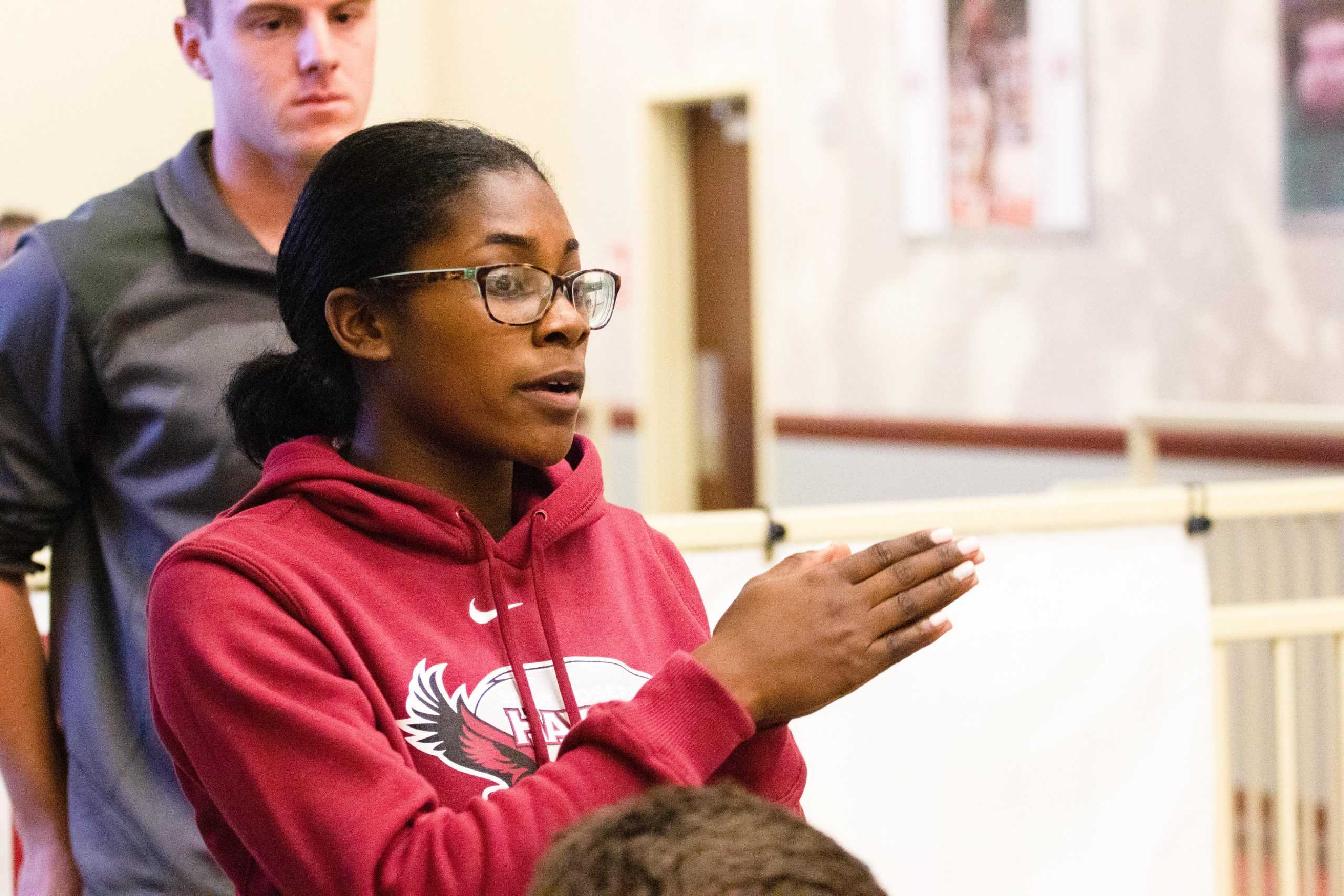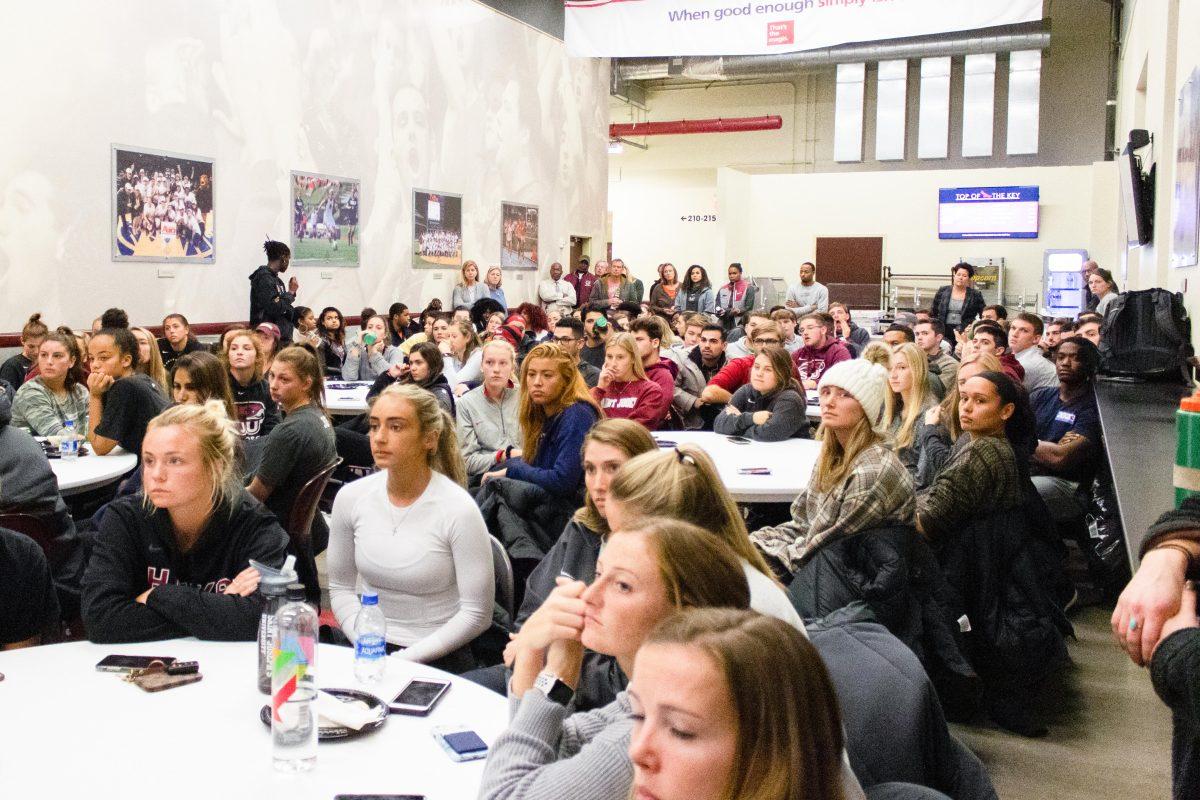About 150 athletes and coaches gathered in Michael J. Hagan ’85 Arena on Dec. 5 for a facilitated discussion about race on campus.
The event was organized by Isis Gill-Reid, a junior women’s tennis player, Slater O’Brien, a junior baseball pitcher, and Director of Athletics Jill Bodensteiner, J.D.

“Slater and I decided to hold this forum to draw attention to the article written in The Hawk,” Gill-Reid said. “We believe it’s important for the voices of student athletes to be heard. We want this to be an opportunity for people to talk about how they feel.”
Students have started to speak about issues of racism on campus after it was reported that a white student left a racial slur on the residence hall door of two black students on Sept 28.
Bodensteiner said she hoped to use the gathering as an opportunity for athletes and coaches to create a better model of how to have conversations about race.
“You’ve all heard my goals,” Bodensteiner told the audience at the forum. “We’re gonna graduate, handle business and win championships. We can’t do that if someone in our community doesn’t feel as though he or she can reach their potential. You can’t reach your potential if you’re in an environment where you can’t thrive.”
After opening remarks by Bodensteiner, Gill-Reid and O’Brien, Gill-Reid invited others to speak but was met with silence. Gill-Reid then directed the audience to talk briefly with members of their own teams who were present and come up with a solution for how the administration should have better handled the incident regarding the racial slur.

After small group discussions among teams, audience members volunteered responses.
Many were upset with what they saw as the apparent lack of punishment of the white student who had vandalized the black students felt board with the racial slur. He was asked to apologize to the two women. The student said he did not know that the word he left on the women’s door, “coons,” was a racial slur. The university did not indicate if he received punishment, citing privacy laws.

“For that to happen in 2018, ‘I don’t know what it meant’, bullsh-t, period,” said Geoff Arnold, assistant coach of the men’s basketball team. “That person knew exactly what they were doing. There are repercussions for what you do.”
Nick Vernacchio, a sophomore on the men’s lacrosse team, said there is a limit to what consequences can achieve.
“We can tell somebody to not do something, and you can increase those consequences and that may never stop somebody from doing it,” Vernacchio said. “It certainly has not stopped it thus far. I think that as a community and especially as athletes, we need to focus on the humanity and care aspect of it.”
Bodensteiner said athletes should be willing to speak up on social issues like this one and not fear repercussions.

“I’m not going to tell you, and I’m not going to let our coaches tell you, to not talk about a social issue that is important to you,” Bodensteiner said. “What we are here to do is educate you on how to do that in a constructive way.
Hayden Seig, a junior on the baseball team, said it wasn’t easy for him to stand up in front of the group to speak, but he felt compelled to do so.
“I’m sitting here getting pissed off, and I’m sitting here shaking,” Seig said. “I live with people of color. I play with people of color. Some of my best friends are people of color, and I still sit back and I don’t do anything because I’m scared of a conflict. But I think the biggest thing is that you need to stand up. You need to be willing to face the conflict.”
Amanda Kulp, a senior on the softball team, said speaking up means being brave.
“If something happens, you need to just shut it down right away,” Kulp said. “Someone has to be brave enough to do that. I haven’t been in the past, and I really regret that, but that’s the start. If someone shuts it down, and another person realizes, ‘Yeah, that wasn’t cool,’ then other people on the team will know the same thing.”

O’Brien agreed.
“The conversations, I know they are not easy to have,” O’Brien said, “but if we bring these conversations into campion or our locker rooms it starts a dialogue. A dialogue is the first thing before action. Don’t be afraid to open your mouth.”

Seig said it’s time to take action and stop sitting on the sidelines.
“It’s not a problem for the black people in this room,” Seig said. “It’s a problem for all of us because those are our brothers and sisters who we’re letting this happen to and watching it happen. This is our family, you guys are our family, and I’m just going to let it happen. I’m not going to let that happen anymore.”
Mitchell Shields ’22 contributed to this report.












































